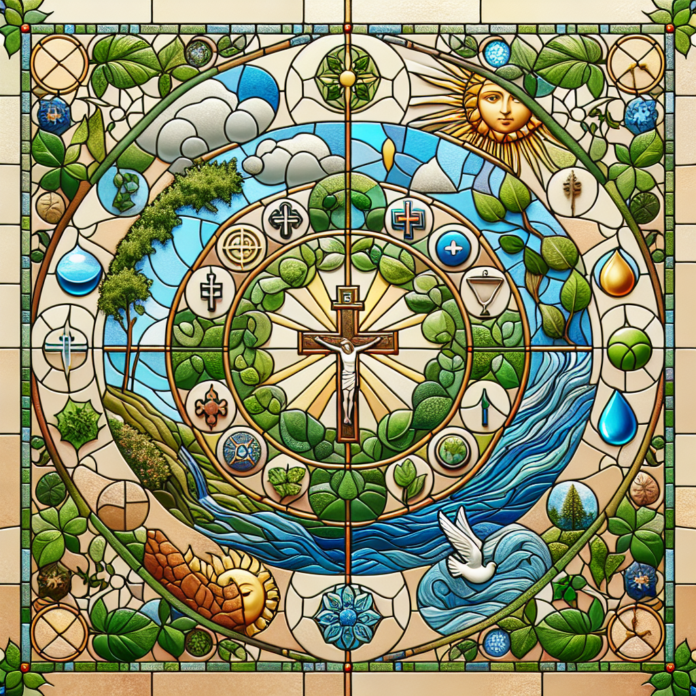Green Theology: The Catholic Case for Climate Justice in the Election
As the 2024 elections approach, the conversation surrounding climate change and environmental stewardship has taken center stage, challenging the traditional divides within political and religious spheres. Among these, the Catholic Church serves as a poignant example of the clash between traditionalism and progressive values, especially on the topic of climate justice. For many, this divide holds significant implications for Catholic voters in determining their stance on candidates and policies aimed at combating the existential threat posed by climate change.
Historically, the Catholic Church has held a complex relationship with environmental issues. Rooted deeply in the appreciation of God’s creation, Catholic teachings have long emphasized the reverence for life and nature. The traditional perspective, however, often focuses more on the preservation of established doctrines and a cautious approach to modern scientific developments. This perspective can be traced back to an era when industrial growth was seen not merely as a necessity, but as a blessing, contributing to the material prosperity of Catholic communities.
Indeed, the Industrial Revolution brought significant economic advancements but also laid the groundwork for today’s environmental crises. Motivated by the promise of progress and the dignity of labor, sectors heavily influenced by Catholic social teaching, such as coal mining and manufacturing, thrived. While these industries bolstered local economies, their lasting legacies are marked by pollution and environmental degradation, often disproportionately affecting the poor—a demographic the Church inherently seeks to protect.
The emergence of green theology within Catholicism represents a profound pivot towards addressing these historical oversights. Rooted in the teachings of modern Popes, particularly Pope Francis, green theology insists on an urgent moral injunction to care for our common home. In his 2015 encyclical, Laudato Si’, Pope Francis explicitly connected environmental degradation with social injustice, calling for a “new dialogue about how we are shaping the future of our planet.” By invoking St. Francis of Assisi, the saint of ecology, Francis compelled Catholics to view creation as intrinsically interconnected with human life and dignity.
In recent years, headlines have underscored this shift within the Church. Catholic dioceses worldwide have initiated numerous environmental programs, from planting trees to endorsing renewable energy projects. Just this year, the Vatican announced its ambitious plan to become carbon neutral by 2050, signaling an unequivocal commitment to sustainable practices.
Despite these commendable strides, a faction within Catholicism—a conservative remnant—remains skeptical, if not resistant, to such progressive approaches. Catholic conservatism, which prioritizes established doctrines and a cautious interpretation of social issues, often raises concerns about the economic implications of radical environmental policies. This hesitancy echoes a broader skepticism towards climate science, influenced by a long-standing alliance with right-wing politics in various countries.
Yet, when we examine the teachings of Jesus Christ—compassion for the poor, the call for justice, and the imperative to care for the marginalized—there is a clear alignment with the principles of environmental justice. The Holy See’s stance has evolved to emphasize that climate change disproportionately impacts the most vulnerable populations, turning environmental neglect into a moral failure.
Recent data has made this reality starkly apparent. According to the United Nations, climate change is expected to push over 100 million people into extreme poverty by 2030. The Catholic Church’s social teaching, which prioritizes the “preferential option for the poor,” demands a proactive and urgent response. This response includes advocating for policies that reduces the carbon footprint, enhancing global cooperation, and ensuring that those most affected by climate changes, such as coastal communities, are protected and uplifted.
The coming election represents, therefore, a critical juncture for Catholic voters. Embracing a green theology approach aligns deeply with the Church’s evolving teachings and contemporary understanding of social justice. When considering candidates and policies, it is imperative for Catholics to move beyond a conservative apprehension of perceived economic drawbacks and towards a holistic perspective that esteems creation care as an integral part of their faith.
In recognizing that economic benefits and environmental preservation are not mutually exclusive, progressive Catholics advocate for a robust green economy. Investments in renewable energies, sustainability programs, and eco-friendly technologies can create jobs and drive economic growth, all while contributing to the broader goal of climatic harmony.
Thus, the intersection of Catholicism and climate justice is not merely a political issue; it is a profound moral calling. Those who adhere to traditionalist reluctance may argue for temperance, but the urgency of the climate crisis implores a fervent and conscientious response. As Pope Francis poignantly captured in Laudato Si’, the Earth “cries out to us because of the harm we have inflicted on her by our irresponsible use and abuse of the goods with which God has endowed her.”
In the voting booths this election season, Catholics have the compelling opportunity and profound duty to align their ballots with the cry of the Earth and the principles of green theology, advancing climate justice through informed and compassionate choices. Thus, adopting progressive environmental policies transcends mere political alignment—it becomes an act of faith, solidarity, and hope for a thriving, sustainable future for all of God’s creation.
